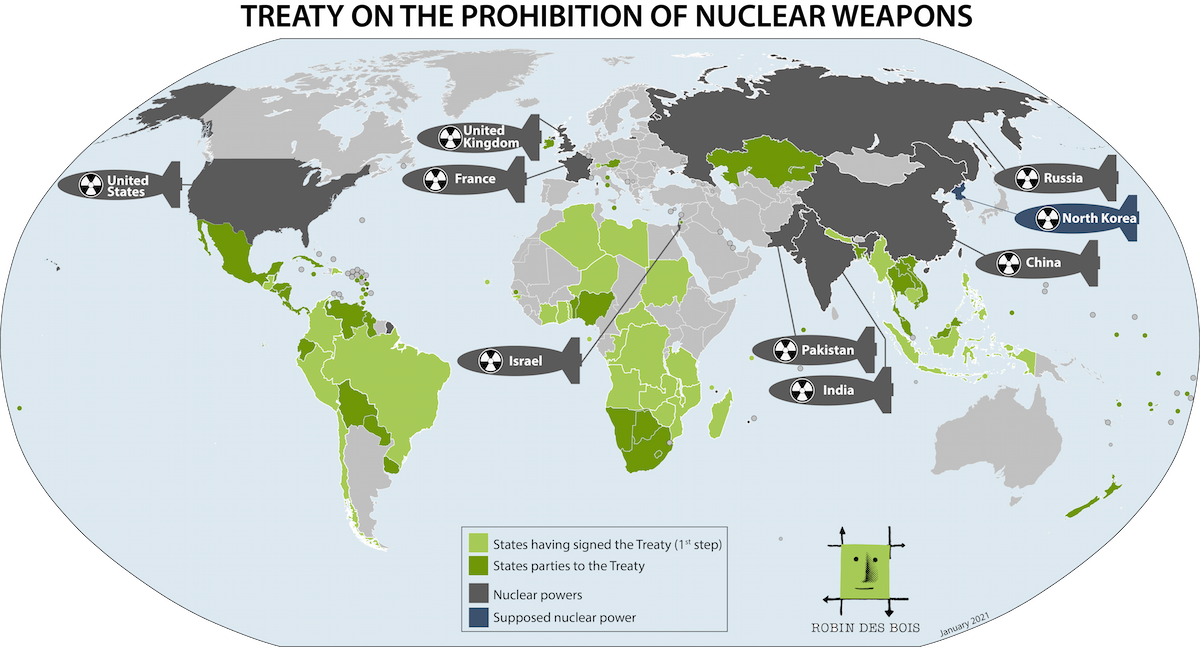This Friday 22 January 2021 is a great day. The Treaty on the Prohibition of Nuclear Weapons (1) enters into force.
On 7 July 2017, 122 countries adopted this Treaty. In accordance with its Article 15, it enters into force 90 days after the deposit of the 50th instrument of ratification, acceptance, approval or accession. Honduras was this 50th categorical opponent to atomic weapons. All the nuclear powers have withdrawn from the adoption Conference and some of them, France, the United States of America and the United Kingdom, are openly hostile to it.
Honour to Austria, Ireland and Malta, the only countries in the European Union that have legally committed themselves to the Treaty. All the other EU countries have so far failed to do so, even Sweden, which declared in July 2017 that it had no choice but to adopt the text.
In Africa, countries like Senegal in the west and Kenya in the east are under pressure from France, the US and the UK. Their good intentions expressed through a positive vote when the text was adopted in July 2017 have not yet materialised (neither signature nor ratification). South Africa was then offended at the United Nations in New York by the “incredible” pressure it had faced not to participate in the adoption Conference.
Central and South America are on the right track, with Mexico, Cuba, Venezuela and Bolivia now States parties. With the notable exception of Argentina, which adopted the text in 2017, the entire South American continent has signed it.
One of the steps towards peace in the Middle East has been missed. In 2017, Iran had proposed numerous amendments and adopted the Treaty, while regretting that the use of nuclear weapons was not considered a crime against humanity. But Iran did not finally sign the text; in 4 years, relations had worsened with the United States of Trump, France, the United Kingdom and Israel. The Middle East seems to be paralysed. Neither Saudi Arabia, Iraq, Jordan, Kuwait, Lebanon, Oman, Egypt nor Yemen, which had adopted the text in 2017, have for the moment legally confirmed their total opposition to nuclear weapons. Only the State of Palestine ratified the text in March 2018.
In Asia, Kazakhstan has also ratified the Treaty, a singular position among the nuclear powers of Russia, China, India and Pakistan.
In November 2020, the mayors of Nagasaki and Hiroshima officially demanded from their governments that Japan sign and approve the Treaty, to no avail for the moment.
The nuclear arsenal held by the United States, Russia, China, France, the United Kingdom, India, Pakistan and Israel is enough to burn, dislocate, shred, kill humanity and biodiversity many times over and poison the world’s ocean and atmosphere for hundreds of thousands of years. The atomic bomb is far worse than the climate bomb. It must be on the World’s agenda. In the coming year the first meeting of all parties to the Treaty on the Prohibition of Nuclear Weapons will be held under the auspices of the UN, probably in Vienna, Austria. It is hoped that by then other States will have committed themselves against atomic warfare.
* * *
(1) The Treaty on the Prohibition of Nuclear Weapons includes an arsenal of prohibitions on participating in any nuclear weapons activities. States parties undertake, inter alia, not to develop, test, produce, acquire, possess, stockpile, use or threaten to use nuclear weapons (or other nuclear explosive devices). The Treaty also prohibits the deployment of nuclear weapons on national territory and the provision of assistance to any State wishing to carry out prohibited activities. The Treaty obliges States Parties to provide adequate assistance to individuals within its jurisdiction affected by the use or testing of nuclear weapons. These parties must also take the necessary and appropriate measures of environmental remediation in areas under their jurisdiction or control contaminated as a result of the testing or use of nuclear weapons. Article 4 provides that each State Party in possession of nuclear weapons or other nuclear explosive devices shall remove them without delay from operational service and destroy them within a time frame to be agreed.
In its preambles, the Treaty mentions the risk of nuclear explosions resulting from an error of assessment, an intentional act or an accident (concerning accidents, see Robin des Bois “From Franco to Trump: the Thermonuclear Saga” about the Palomares accident in Spain in 1966).
Other publications by Robin des Bois on the Treaty on the Prohibition of Nuclear Weapons
” The Atomic cartel on the defensive “, 7 December 2017
” The Bastille Day is nuclear “, July 14, 2017
 Imprimer cet article
Imprimer cet article









